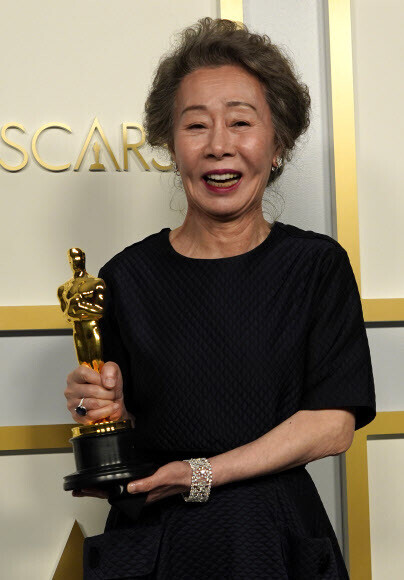hankyoreh
Links to other country sites 다른 나라 사이트 링크
With first S. Korean acting Oscar win, Youn Yuh-jung makes history

Youn Yuh-jung received the Oscar for best supporting actress, becoming the first South Korean actor to be recognized at the 93rd Academy Awards. Her award can be seen as a major step toward breaking down racial and linguistic barriers.
Critics said the universal appeal of Youn's acting in the film "Minari" helped force the Oscars to overcome its long neglect of films in languages other than English. Her award is the latest indication of evolution at the Academy of Motion Picture Arts and Sciences, which has recently taken steps to increase racial diversity and the percentage of women among its members.
First of all, critics point to the significance of the Academy giving an acting award for a Korean-language role.
"' Parasite,' which is all in Korean, won best picture and best director at the Oscars last year, but it's actually much harder to win the acting Oscars. In that sense, Youn's Oscar for a Korean-language role is even more historic than the Oscars won by 'Parasite' last year," said Chun Chan-il, a film critic.
"With' Parasite' last year, we saw an attempt to break down the language barrier, but 'Minari' was the film that made it possible to win an Oscar for acting. I think that was because [Youn's] acting was universal enough to transcend language," said Kim Hyung-seok, another critic.
To see just how groundbreaking Youn's Oscar is, we only have to look back five years, to 2016, when everyone nominated for an acting Oscar was white. That was particularly controversial given the predominance of whites among the directors and actors who make up the Academy's membership.
Widespread criticism about pervasive white overrepresentation at the Academy, including the hashtag #OscarsSoWhite that trended on social media, forced a reckoning about the fact that the ceremony had long functioned as a "whites only" party.

The first sign of change came in 2018, when the Academy hiked up the percentage of BIPOC and women in its membership. The percentage of BIPOC, which had hovered around 10% each year, was elevated to 38%, while the percentage of women was also brought to parity, at 49%.
Such changes are thought to have affected Youn's triumph at the Oscars.
"The four Oscars won by 'Parasite' last year and Youn's Oscar for best supporting actress reflect not only the quality of the films and praise for Youn's acting but also the Academy's attempt to reform itself. Chloé Zhao, director of 'Nomadland,' became the first female of Asian descent to win best director, showing that the Oscars are trying to broaden their reach beyond the US," Kim said.
Academy members paid particular attention to minorities in the nominations and awards this year, producing what could be called a multiracial festival.
In an online press conference held after the awards ceremony on Sunday, Youn gave a nod to the Academy's evolution.
"It's not very nice to divide [people into different races]. If we put all the colors together, it makes it prettier," Youn said, comparing that to a "rainbow."
Newspapers around the world were quick to cover news that the second actor of Asian descent had won the Oscar for best supporting actress.
Soon after the awards were announced Sunday, the Los Angeles Times printed a story titled, "' Minari' breakout Yuh-Jung Youn makes Oscars history as first ever Korean acting winner."
"South Korea's Yuh-Jung Youn made history Sunday night, winning the supporting actress Academy Award for her role as the mischievous but wise grandmother Soonja in Lee Isaac Chung's family drama 'Minari,' her American film debut," the newspaper said.
The New York Times reported the news of Youn's Oscar win by quoting her as saying, "Tonight, I have just a little bit [of] luck, I think."
"Youn has been a sensation on Korean screens for decades, most often playing witty, thought-provoking characters," Reuters said in its coverage of the award.
The Guardian also posted an article titled "Youn Yuh-jung wins best supporting actress Oscar for Minari" immediately after the ceremony.
"Youn was on relatively restrained form at the Oscars," the British newspaper said. "She thanked the Academy fulsomely and [praised] the Minari' family,' particularly the film's director Lee Isaac Chung."
The Guardian added that Youn had thanked her "two boys who make me go out and work."
The Japanese press also highlighted the significance of Asian women winning the Oscars for best supporting actress and best director, both major awards.
"Youn Yuh-jung has received high praise for her acting in 'Minari.' This was the first time an Asian woman has won the Oscar for best supporting actress since Japanese-American Miyoshi Umeki in 1958," said the Asahi Shimbun, a Japanese newspaper.
"The Academy Awards [this year] were historic, with Asian women taking home the Oscars for best director and best supporting actress," the newspaper added.
By Oh Seung-hun, staff reporter
Please direct comments or questions to [english@hani.co.kr]

Editorial・opinion
![[Editorial] Intensifying US-China rivalry means Seoul must address uncertainty with Beijing sooner than later [Editorial] Intensifying US-China rivalry means Seoul must address uncertainty with Beijing sooner than later](https://flexible.img.hani.co.kr/flexible/normal/500/300/imgdb/original/2024/0517/8117159322045222.jpg) [Editorial] Intensifying US-China rivalry means Seoul must address uncertainty with Beijing sooner than later
[Editorial] Intensifying US-China rivalry means Seoul must address uncertainty with Beijing sooner than later![[Column] When ‘fairness’ means hate and violence [Column] When ‘fairness’ means hate and violence](https://flexible.img.hani.co.kr/flexible/normal/500/300/imgdb/original/2024/0516/7417158465908824.jpg) [Column] When ‘fairness’ means hate and violence
[Column] When ‘fairness’ means hate and violence- [Editorial] Yoon must stop abusing authority to shield himself from investigation
- [Column] US troop withdrawal from Korea could be the Acheson Line all over
- [Column] How to win back readers who’ve turned to YouTube for news
- [Column] Welcome to the president’s pity party
- [Editorial] Korea must respond firmly to Japan’s attempt to usurp Line
- [Editorial] Transfers of prosecutors investigating Korea’s first lady send chilling message
- [Column] Will Seoul’s ties with Moscow really recover on their own?
- [Column] Samsung’s ‘lost decade’ and Lee Jae-yong’s mismatched chopsticks
Most viewed articles
- 1[Editorial] Transfers of prosecutors investigating Korea’s first lady send chilling message
- 2[Column] US troop withdrawal from Korea could be the Acheson Line all over
- 3[Column] When ‘fairness’ means hate and violence
- 4China calls US tariffs ‘madness,’ warns of full-on trade conflict
- 5Major personnel shuffle reassigns prosecutors leading investigations into Korea’s first lady
- 6[Editorial] Yoon must stop abusing authority to shield himself from investigation
- 7Could Korea’s Naver lose control of Line to Japan?
- 8[Editorial] Korea must respond firmly to Japan’s attempt to usurp Line
- 9US has always pulled troops from Korea unilaterally — is Yoon prepared for it to happen again?
- 10[Column] Welcome to the president’s pity party